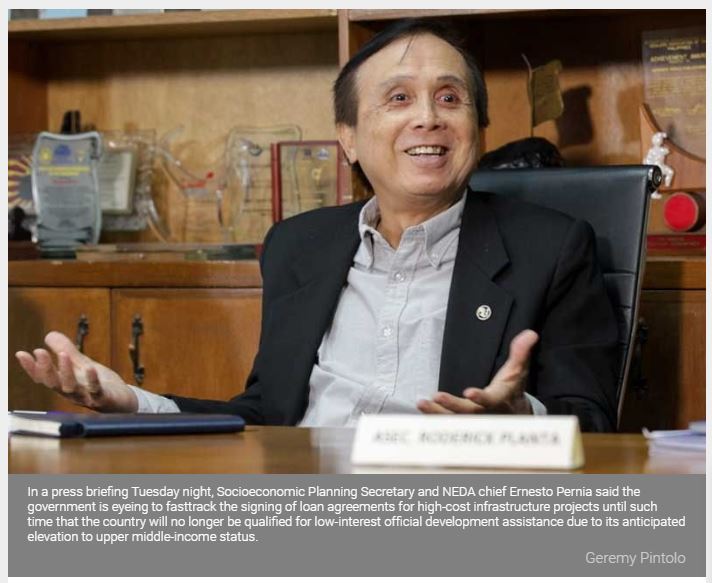Philippines: Government urged to adjust borrowings as rates remain low
CLARK, Pampanga, Philippines — The government may have to adjust its borrowings in the next three years to take advantage of low interest rates, which the country may not be able to enjoy anymore with its promotion to upper middle-income economic status, according to the National Economic and Development Authority (NEDA).
In a press briefing Tuesday night, Socioeconomic Planning Secretary and NEDA chief Ernesto Pernia said the government is eyeing to fasttrack the signing of loan agreements for high-cost infrastructure projects until such time that the country will no longer be qualified for low-interest official development assistance due to its anticipated elevation to upper middle-income status.
“What we have to do now is to prioritize projects, such that those that are more costly than others will be prioritized. The more costly ones, we want them to move faster than the lesser costly ones,” he said.
Included in the projects which may be prioritized are the Metro Manila Subway Project, the North-South Commuter Railway Project and other big-ticket infrastructure projects, particularly those in Mindanao.
Pernia said the country’s elevation into an upper-middle income economy may be moved to 2020 from the original expectation of 2019, due to lower economic growth outlook for this year.
He attributed this to the delay in the passage of the 2019 budget, as well as headwinds in the global economic landscape.
Once this happens, Pernia said the Philippines would only have up to 2022 to qualify for the lower interest rates being enjoyed by low income economies for loans under Japan’s Special Terms of Economic Partnership (STEP).
“Once we achieve upper middle income country – which we anticipated around the end of this year, but it could move back to 2020 because of our lower economic growth rate this year, possibly – then we will not be qualified for the STEP funding,” Pernia said.
“There’s two years of grace period between the time we achieve upper middle income (status) and the non-qualification for us to be able to avail of STEP funding,” he added.
Economic expansion in the first quarter of the year settled at a four-year low of 5.6 percent mainly due to slower spending, which was brought about by the delay in the passage of the 2019 budget.
Due to the budget delay, the Development Budget Coordination Committee (DBCC) also cut the gross domestic product (GDP) growth target to a range of six to seven percent from the original goal of seven to eight percent.
Earlier, the Department of Finance (DOF) said the country’s forthcoming upper middle income status may translate to higher borrowing costs as it would no longer be qualified for the preferential rates offered by development institutions to low-income and low-middle income economies.
Considering this, the DOF said the government had to act fast before the cost of borrowing money increases.
The agency said the government took advantage of the opportunity to borrow at low, concessional rates by frontloading its borrowings and diversifying their sources to jumpstart its ambitious Build Build Build infrastructure modernization program.
The DOF, however, said this opportunity was missed by the past administration because of its failure to borrow funds. As a result, the past administration was not able to close the country’s infrastructure gap.
Source: https://www.philstar.com/business/2019/06/20/1927856/government-urged-adjust-borrowings-rates-remain-low#LPPEqBkqArHb1oru.99


 Thailand
Thailand




